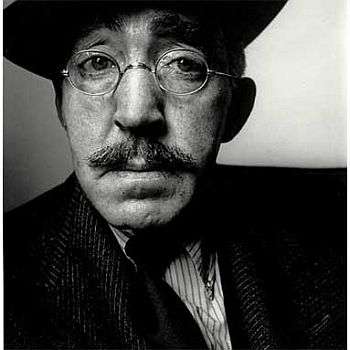S. J. Perelman

Button-cute, rapier-keen, wafer-thin and pauper-poor is S.J. Perelman, whose tall, stooping figure is better known to the twilit half-world of five continents than to Publishers' Row. That he possesses the power to become invisible to finance companies; that his laboratory is tooled up to manufacture Frankenstein-type monsters on an incredible scale; and that he owns one of the rare mouths in which butter has never melted are legends treasured by every schoolboy.
—S. J. Perelman, describing himself.
Sidney Joseph "S.J." Perelman (American, 1904-1979) was a humorist whose work appeared in several different media. The Other Wiki puts it bluntly: "Perelman's work is difficult to characterize."
Perelman co-wrote the scripts for the Marx Brothers films Monkey Business (1931) and Horse Feathers (1932) (which should establish his humorist bona fides), and won an Academy Award in 1956 for his screenplay for Around the World in Eighty Days. He also co-wrote (with Ogden Nash) the book to the 1943 Broadway musical One Touch of Venus, to music by Kurt Weill; a few years later Sweet Bye and Bye, a musical which employed the talents of Perelman, Ogden Nash and Al Hirschfeld, "closed in Philadelphia like a ten-cent mousetrap" (as Perelman put it) before reaching New York.
But it is his humor writing which is commended here. Andrew Ferguson wrote about Perelman's 1948 book Westward Ha! in that well-known humor compendium, the Wall Street Journal, in 2006: "For sheer verbal virtuosity, for his dizzy manipulation of language, Perelman deserves a place at the top of the trade." His wordplay was reminiscent of James Joyce, but Perelman's style was different-- read the quote above and you'll see.
Perelman could apparently write about anything. For example, an off-hand phrase he stumbled upon in a New York Times Magazine article ("...the late Pandit Motilal Nehru-- who sent his laundry to Paris-- the young Jawaharlal's British nurse etc. etc.") became his 1955 classic "No Starch in the Dhoti, S'il Vous Plaît", a series of imaginary letters that might have been exchanged in 1903 between an angry Pandit Nehru in India and a Parisian laundryman. One posthumously-published piece ("To Yearn Is Subhuman, To Forestall Divine") references The Texas Chainsaw Massacre (!!).
Those seeking an introduction to Perelman should check out one of the many collections of his work, such as The Most of S.J. Perelman.
- The Charmer: With overtones of Casanova Wannabe or Dirty Old Man (see Self-Deprecation below). Quite a few of Perelman's stories use his flirting with attractive ladies (or escorting one on a date at a friend's behest) as a plot point. Perelman's real-life affairs give this a Reality Subtext.
- Crunchtastic: His fondness for wordplay made adspeak an especially ripe target, though other commercial tropes got mocked as well, including:
- Before and After Pictures ("Sauce For the Gander")
- Everything Talks ("Well, Roll Me In a Turkish Towel!", "This Little Piggy Went to Market", "I Am Not Now, Nor Have I Ever Been, a Matrix of Lean Meat")
- Hopemongering ("Tomorrow -- Fairly Cloudy")
- Horrible Hollywood: Though with enough lightness to be more of a Ridiculous Hollywood.
- MST: Mystery Science Theater 3000's creators weren't even a lewd thought when Perelman's "Cloudland Revisited" essays were written, but they do qualify as the kind of mocking critique that goes by the trope name these days.
- Hypocritical Humor: There's at least one piece out there where Perelman decries women as frivolous creatures unable to comprehend perfectly sensible actions like using a tape recorder to eavesdrop on the conversation of the groceries in the refrigerator.
- Pungeon Master: Often in the form of Punny Names, such as the law firm of Howells & Imprecations.
- Self-Deprecation
- Travelogue Show: Or rather, Travelogue Story -- in particular Westward Ha! and its sequel Eastward Ha!.
- Viewers Are Geniuses: He tried to sneak a pun in German into a Marx Brothers movie. Groucho (who tended towards the Viewers are Morons belief) objected.